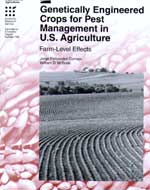Genetically Engineered Crops for Pest Management in U.S. Agriculture
- by Jorge Fernandez-Cornejo, William D. McBride, Cassandra Klotz-Ingram and Nora Brooks
- 5/1/2000
Overview
Adoption of genetically engineered crops with traits for pest management has risen dramatically since their commercial introduction in the mid-1990's. The farm-level impacts of such crops on pesticide use, yields, and net returns vary with the crop and technology examined. Adoption of herbicide-tolerant cotton led to significant increases in yields and net returns, but was not associated with significant changes in herbicide use. On the other hand, increases in adoption of herbicide-tolerant soybeans led to small but significant increases in yields, no changes in net returns, and significant decreases in herbicide use. Adoption of Bt cotton in the Southeast significantly increased yields and net returns and significantly reduced insecticide use.
Download
-
Entire report
Download PDF -
Frontmatter (Title page, Contents, Summary)
Download PDF -
Introduction
Download PDF -
Background
Download PDF -
Data and Methods
Download PDF -
Adoption of Genetically Engineered Crops
Download PDF -
Farm-Level Effects of Adoption
Download PDF -
Concluding Comments
Download PDF -
References
Download PDF

